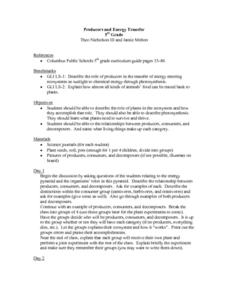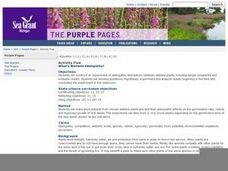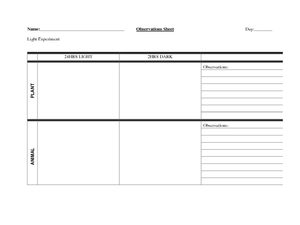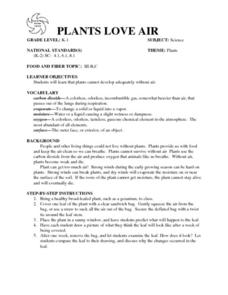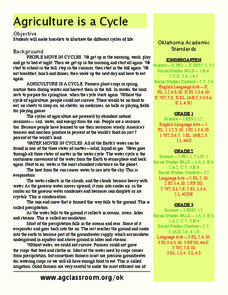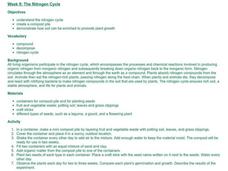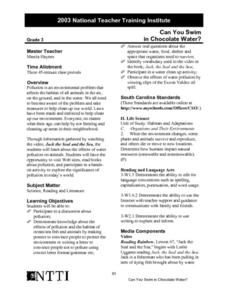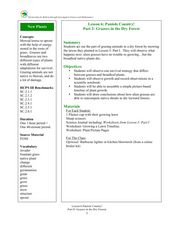Curated OER
Life Cycles
Using computers, Students work in small groups and progress through the roles of Explorer, Researcher, Designer, and Evaluator as they study the life cycle of plants, insects, butterflies and frogs.
Curated OER
Sea Scape
Students learn about and make models of coral reefs. In this reef ecosystem instructional activity, the class locates a number of coral reefs on a map. They learn how a coral reef is a balanced ecosystem that depends upon all of it's...
Curated OER
Food Web Chasey
Students work together to review the concepts of food webs and food chains. They describe the role of plants and animals when dealing with the cycling of energy. They identify any behavioural strategies to help the animals survive.
Curated OER
Producers and Energy Transfer
Fifth graders discuss the relationship between producers, consumers, and decomposers as they look at the energy pyramid. While working in small groups, they create an ecosystem that includes all or some of the given categories, and they...
Curated OER
What's Wetland Allelopathy?
Students study plants and what they need to thrive and survive. They make plant extracts from chosen wetland plants and test their allelopathic effects on the germination rate, radicle growth, and hypocotyl growth of test seeds of other...
Curated OER
Organisms – Their Needs
Students compare and contrast different organisms characteristics. In this life science lesson plan, students design an experiment about plants and animals needs. They collect data and write their conclusion about the experiment.
Curated OER
PLANTS LOVE AIR
Pupils identify that plants cannot develop adequately without air and predict what happens to the leaf of a geranium brought to class. They draw a picture of what they think the leaf will look like after a week of being covered. Finally,...
Curated OER
Agriculture is a Cycle
Learners explore cycles in nature. In this cross curriculum agriculture lesson, students define "cycle" and research weather and planting folklore. Learners make a bracelet in which individual colored beads represent the many "cycles" of...
Curated OER
Carrying Capacity of Ecosystems
Students define population and carrying. In this algebra lesson, students explore exponential growth and decay based on animals and things that grow or decrease exponentially. They graph their findings and discuss their results as they...
Curated OER
The Big Hideout
Students identify the types of camouflage used by animals in the desert. They work together to create their own animal creating their own type of camouflage. They determine how well the camouflage works.
Curated OER
The Compost Bucket
Students recognize that plants and soils have a close relationship. They view a photo essay on the common practice and natural process of composting. Afterwards, they observe the process of plant decay over the course of several days.
Curated OER
Salinity Of Soil
Fourth graders investigate the contents of various types of soil to determine the differences in salinity levels. They conduct an experiment of observing the plants in the different soils. Students then determine survival rates by...
Curated OER
How Dry I Am
Students observe two similar plants as one gets regular water and one does not. They observe plants for a week and record their findings.
Curated OER
Mini-Ponds
In this mini pond worksheet, students create a mini-pond ecosystem with soil, water, and plant life. Students let their ecosystem sit for a day and they observe a sample the next day. Students identify all the pond water microorganisms...
Curated OER
Planting Seeds Around the World
First graders discuss the book The Lorax and research what living things need. In this environmental lesson plan, 1st graders investigate how humans affect the growth of plants. Students conduct an experiment with sunflowers.
Curated OER
The Nitrogen Cycle
Young scholars design and create a compost pile in order to study the Nitrogen Cycle. They then use the scientific method to determine if plants grow better when they add organic matter from their compost pile to the plant's soil.
Curated OER
Bugs in the Woods
Second graders identify insects and plants in the forest ecosystem in a structured field trip with stations and activity booklets. In this bugs lesson, 2nd graders explore the ecosystem of the forest, complete the booklet and play the...
Curated OER
Shelter
Students study shelter and how plants, animals, and people must have shelter to survive. In this shelter activity, students read paragraphs about various shelters and their necessity with plants, animals, and people.
Curated OER
Creature Features
Students examine why certain animals live in only specific places throughout the world. Using animals, they classify them based on their characteristics and identify their basic needs. They also observe and compare the life cycles of...
Curated OER
The Web of Life - Ecosystem
Students examine the concepts of ecosystems and interdependence. They construct block pyramids to demonstrate interdependence, and map off an area to observe and identify animals. They create food chain mobiles and play a web of life game.
Curated OER
The Mechanisms of Decay and Decomposition
Eighth graders study how all living things die. They are introduced tot he life cycle and the concept of an ecosystem. Students have a introductory exposure to trophic levels (producer-consumer-decomposer) in the environment.
Curated OER
Can You Swim in Chocolate Water?
Third graders discss water pollution and its affects on animals. They watch a demonstration using a plastic fish in a fish bowl in which various types of water pollution are illustrated.
Curated OER
Winter Season
Students recognize the relationship between Earth's tilt and the Winter season. In this Winter lesson plan, students work in pairs to complete make frost and design snow goggles. Students experiment a hand lens to study the frost...
Curated OER
Lesson 6: Paniolo Country Grazers in the Dry Forest
Students explore grazing animals in a dry forest. In this science lesson, students act out the role of a grazer in the dry forest. Students cut their growing lawn and observe what happens after being cut. Students explore differences...





